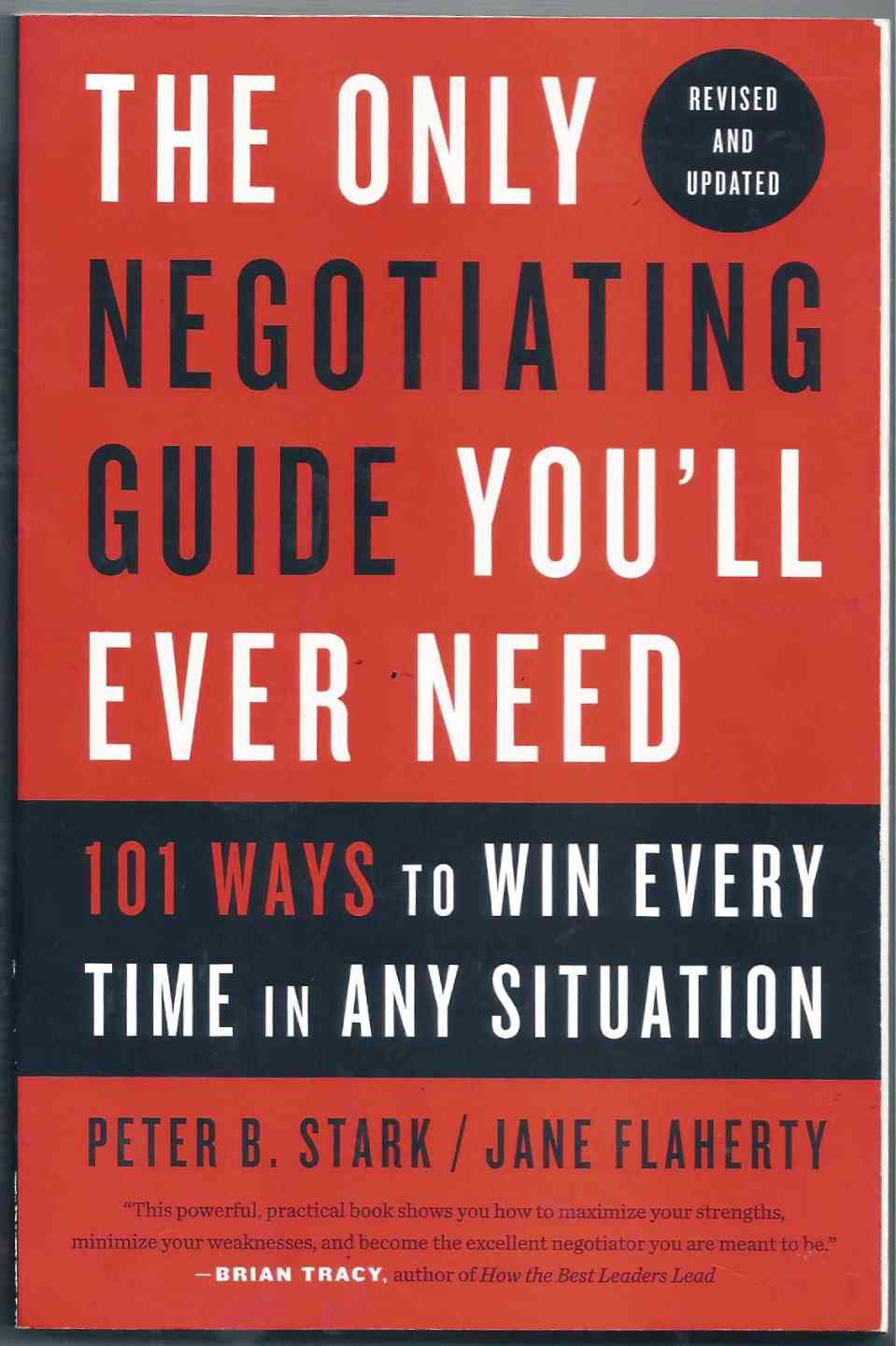Never negotiate out of fear
I distinctly recall negotiating for the brief use of a parking slot for PWDs (persons with disabilities).
I flashed my senior citizen ID card, thus grudgingly admitting to being a “dual citizen”—Filipino and a senior citizen—and that such citizenship is a “disability.”
Never mind that my self-esteem was crushed before a smiling lady attendant.
Because of my resolve, the parking attendant allowed me to use that most precious parking space.
Dear readers, that’s negotiation appealing to the mind or the heart, according to this book.
“Is everything negotiable?” the book authors ask.
“The Only Negotiating Guide You’ll Ever Need” by Peter B. Stark and Jane Flaherty has provided many answers.
They are quick to add, though, that some things are non-negotiable.
In this book review, we will cover items that can be negotiated, and how one can negotiate to seize an advantage and then win.
Will you go for a win-lose outcome, or will you rather go for a win-win result?
Obviously, the latter is preferable. A win-win arrangement is good for the long-term and for a viable relationship to continue.
In the global scene, the South China Sea issue is either negotiable or non-negotiable. The Philippines can actually take a stand that the territory and our marine rights cannot be negotiated because, first of all, an arbitral tribunal of the United Nations Convention on the Law of the Sea (Unclos) already ruled that China was wrong in claiming exclusive rights over the disputed waters.
Negotiate from the standpoint of authorities.
Our leaders may learn from this negotiating tip, because they can rightly say that the authority of the Unclos must be invoked.
After all, China is a signatory to the Unclos.
I was personally present during the Asean Foreign Ministers Meeting in Vientiane, Laos last year, and I heard China’s foreign minister declaring that, first of all, China does not accept the jurisdiction of Unclos over the South China Sea issue; and second; they are not recognizing the arbitral tribunal ruling.
One negotiating point China is using: “Be unreasonable at the start.”
These negotiation postures are among the “101 Ways to Win Every Time In Any Situation,” a subtitle in the book.
This book, all of 286 pages, is a very readable piece of business and political literature, owing to the abundance of tips, profiles and answers to various questions.
Part 1 of the book focuses on “The Skillful Negotiator,” covering most of the topics.
It begins with a self-administered test for you to find out at what level of expertise you are in the negotiation game.
The authors lose no time in identifying time, information, and power as the triumvirate in winning a negotiation.
Time is of the essence. The book introduces us to Pareto’s Law: “Most often, negotiations will conclude in the final 20 percent of the time allowed.”
Vilfredo Pareto, the Italian economist and sociologist who defined the principle, stipulated: “Twenty percent of what you do produces 80 percent of the results; conversely, 80 percent of what you do produces only 20 percent of the results.”
This means that you may go slow at the beginning of the negotiation process, then come up with firm negotiating points when you reach 20 percent of the remaining time available to hammer out a bargain.
I recall another author on negotiation who said: If the other party has a deadline to negotiate an outcome, and your deadline is still a long way off, you have the advantage. Does the car salesman have a deadline to meet the sales quota? On the other hand, you are not in a hurry to add to your fleet of cars. Therefore, you have an advantage.
Does China have a deadline on the issue of its claim on the South China Sea? Does the political scene in China require the leader to demonstrate political savvy, just in case the Communist Party will evaluate his performance?
It looks like our President is not being pressured to meet a deadline. This points to the strategy linked to the “law of delay.”
Information as negotiation advantage. The book puts it negatively: “Whenever you know less about the topic being negotiated and your counterpart knows, you are at risk.” Why? The side with the most and best information usually perceives the better outcome in a negotiation.
In a prospective merger of two firms, the executive who knows that, say, the other party has liquidity problems, takes the upper hand. That’s because the cash-short party cannot unduly prolong the negotiation and will thus make concessions.
Do we have more information about China, or does China know more about us? Are we revealing too much information?
Power, not used, is useless. “Several types of power can influence the outcome of a negotiation,” the book points out. “We emphasize the word ‘can’ because if you have power but don’t use it, the power adds no value to the negotiations.”
For corporate folks, the use of power is important. The book cites a few interesting sources of power: position, expertise, and character bring power to the negotiation table.
What about these: charisma, perceived lack of interest and—craziness? “Every organization has someone who blows up or behaves irrationally when confronted with problems,” the authors note. To avoid conflict, the irrational gets some negotiating advantages.
The book has a wealth of ideas, tactics, tools, and calibrated initiatives for all types of negotiations—from the employee who must use timing to ask for a raise to a country defending its territory.
In the very first chapter, the authors quote John F. Kennedy, whose memorable foreign affairs policy must be instructive: “Let us never negotiate out of fear, but never fear to negotiate.” —CONTRIBUTED
“The Only Negotiating Guide You’ll Ever Need” by Peter B. Stark and Jane Flaherty, Crown Business, 2017 edition
